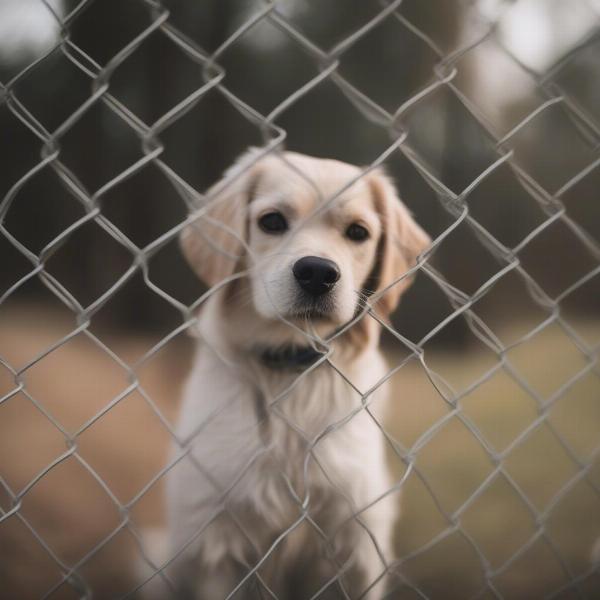Choosing the right fencing for your dog is crucial for their safety and your peace of mind. Wire fencing is a popular option for dog owners due to its affordability and durability. However, navigating the various types of wire fencing and understanding their suitability for different dog breeds and temperaments can be challenging. This guide will provide you with a comprehensive overview of wire fencing options, helping you make an informed decision that keeps your furry friend safe and contained.
Types of Wire Fencing for Dogs
There are several types of wire fencing suitable for dogs, each with its own pros and cons:
Chain Link Fencing
Chain link is a common and cost-effective option. It’s relatively easy to install and provides good visibility. However, some determined dogs may be able to climb or dig under it. For climbers, consider adding angled extensions at the top. For diggers, bury chicken wire at the base of the fence or place large rocks along the perimeter.
Welded Wire Fencing
Welded wire fencing, often seen in livestock enclosures, can also be used for dogs. It’s stronger than chain link and comes in various gauges and mesh sizes. Smaller mesh is crucial for containing smaller dogs. While sturdy, welded wire can be more challenging to install than chain link.
Field Fencing
Field fencing is typically used for larger properties and containing livestock, but it can be adapted for dogs. It’s less visually appealing than other options but offers good value and durability. However, ensure the spacing between wires is narrow enough to prevent your dog from squeezing through.
Choosing the Right Wire Gauge and Mesh Size
The gauge refers to the thickness of the wire; lower gauge numbers indicate thicker wire. The mesh size refers to the openings in the fence. For smaller dogs, a smaller mesh size is essential to prevent them from escaping. Larger dogs require a thicker gauge wire to prevent them from breaking through.
Factors to Consider When Choosing Wire Fencing
Several factors beyond the type of wire fencing influence your choice:
Your Dog’s Breed and Temperament
Is your dog a climber, a digger, or an escape artist? Understanding their behavior is critical for selecting appropriate fencing. For example, a highly energetic husky might require a taller and more secure fence than a calmer, smaller breed.
Your Budget
Wire fencing is generally more affordable than other options, but costs vary based on material, height, and installation.
Local Regulations
Check local ordinances regarding fence height and material restrictions before installation.
Installation and Maintenance
Proper installation is key to the effectiveness of your wire fencing. Ensure posts are securely set in concrete and the fence is taut. Regularly inspect the fence for damage and repair any gaps or weak points promptly.
Alternatives to Wire Fencing
While wire fencing is a popular option, other alternatives might be more suitable depending on your needs and preferences:
- Wooden fencing: Offers aesthetic appeal but can be more expensive and require more maintenance.
- Vinyl fencing: Durable and low-maintenance, but can be more costly than wire fencing.
- Invisible fences: Use buried wires and collars to create boundaries, but not suitable for all dogs.
Conclusion
Wire fencing offers a practical and cost-effective solution for containing dogs. By carefully considering your dog’s breed, temperament, your budget, and local regulations, you can choose the right type of wire fencing to provide a safe and secure environment for your furry friend. Remember to install it correctly and maintain it regularly to ensure its long-term effectiveness.
FAQ
- What is the best wire fencing for small dogs? Welded wire fencing with a small mesh size is generally recommended for small dogs.
- How tall should my dog fence be? The height depends on your dog’s breed and jumping ability, but a minimum of 4 feet is often recommended.
- Can I install wire fencing myself? Yes, but professional installation can ensure proper tension and prevent future problems.
- Is wire fencing safe for dogs? Yes, when chosen and installed correctly. Ensure there are no sharp edges and the wire is appropriately gauged.
- How do I prevent my dog from digging under a wire fence? Bury chicken wire at the base or place large rocks along the perimeter.
- What is the most affordable type of wire fencing? Chain link is generally the most affordable option.
- How do I maintain my wire fence? Regularly inspect for damage and repair any gaps or weak points.
 Dog behind wire fence
Dog behind wire fence
Expert Quote: “Choosing the right fence is a critical aspect of responsible dog ownership,” says Dr. Emily Carter, a veterinarian with over 15 years of experience. “It not only protects your dog but also prevents them from becoming a nuisance to neighbors or wandering into dangerous situations.”
waterproof and washable dog beds
Expert Quote: “Remember that even with the most secure fence, regular supervision and interaction are essential for your dog’s well-being,” adds renowned dog trainer, Mark Johnson.
ILM Dog is your global resource for all things dog-related. We offer expert advice on dog breeds, health, training, nutrition, grooming, and much more. From puppy care to senior dog care, we are here to help you navigate every stage of your dog’s life. We also provide information on travel with your dog and recommendations for the best products and accessories. Contact us today for personalized guidance! Email: [email protected], Phone: +44 20-3965-8624. ILM Dog is committed to helping you provide the best possible care for your canine companion.